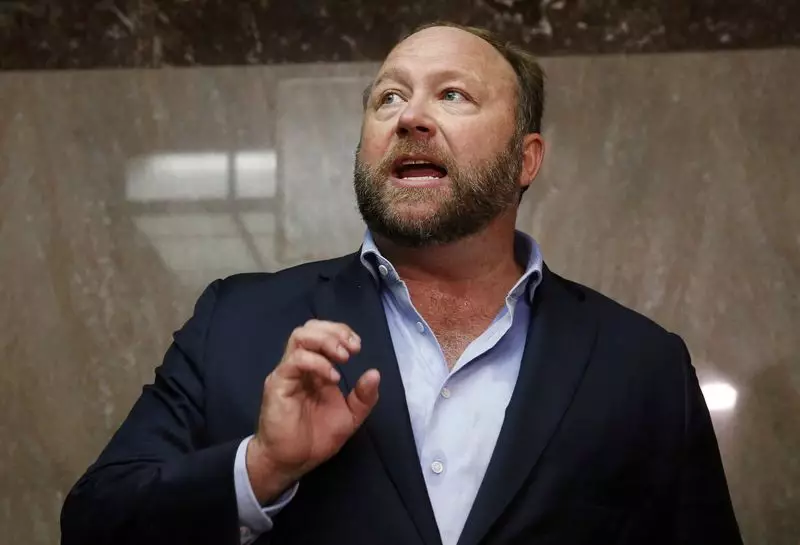In a striking development within the realm of bankruptcy proceedings, U.S. Bankruptcy Judge Christopher Lopez recently made a decisive ruling concerning the disputed sale of Alex Jones’ controversial site, Infowars. The case unfolded as a courtroom drama that not only highlighted the legal complexities surrounding bankruptcy auctions but also called into question the ethical implications of media representation and the challenges of accountability in the digital age.
Jones, a well-known conspiracy theorist, found himself ensnared in a web of legal challenges following his inflammatory assertions regarding tragic events, most notably the Sandy Hook Elementary School shooting. The aftermath of his comments led to substantial defamation lawsuits, culminating in over $1.3 billion in judgments owed to the families of the victims. The effects of his rhetoric and the subsequent court rulings had far-reaching consequences, depicting the struggle between free speech and accountability.
The legal turmoil thrust Jones into bankruptcy proceedings, forcing him to liquidate assets to cover the staggering financial liabilities incurred from the lawsuits. Entering this tumultuous arena, Infowars became a focal point of contention as various bidders sought to acquire the platform. The structure of the auction raised questions, particularly regarding the integrity and efficacy of the bidding process.
The bankruptcy auction, which initially awarded the Onion—a satirical news organization—the rights to Infowars, quickly fell under scrutiny. Jones and a partnered company, First American United Companies, raised alarms regarding the auction, alleging issues of collusion and irregularities that they argued compromised the legitimacy of the bidding. Judge Lopez, however, dismissed most of these claims but acknowledged that the auction process itself was flawed due to the quick progression to final offers.
Critically, Judge Lopez identified that the bankruptcy trustee made a “good-faith error,” emphasizing the importance of promoting a more competitive environment. Lopez noted that by limiting the bidding process, the trustee might have forsaken potential greater revenue that could have significantly benefitted creditors—an unfortunate outcome in a case where the creditors include bereaved families seeking reparations for the pain caused by Jones’ rhetoric.
The Onion’s bid was appraised at $7 million largely due to the supportive stance taken by the Sandy Hook families, a testament to their resilience and strategic foresight in the face of dire circumstances. They opted to forgo some repayment, demonstrating both a commitment to accountability and a willingness to forgo immediate financial gain for the greater good. Conversely, the competing bid from First American United Companies was contended to be more straightforward but less flexible, aimed directly at maximizing recovery for its stakeholders.
The courtroom actions leading to this ruling were heavily underscored by emotional and societal stakes, as sentiments surrounding Jones’ actions and the defamation of the Sandy Hook families permeated the discussions. The courtroom thus transformed into an arena not just of legal principles, but of moral clarity, as the legacy of Jones’ actions cast a long shadow.
The Onion’s Vision for the Future
Despite the setback, the Onion expressed its determination to purchase Infowars, aiming to pivot the platform towards a more humorous and less divisive narrative landscape. The Onion’s CEO articulated a vision for a future where Infowars could evolve into a space marked by satire rather than hostility. However, these aspirations are clouded by ongoing legal complexities and the demands of creditors who have stood resolute against Jones’ disinformation campaigns.
On the other hand, Jones celebrated the ruling, viewing it as a validation of his narrative against what he perceives as an aggressive and manipulative media landscape. This dichotomy of perspectives illustrates the robust debates surrounding accountability and the real-world implications of media platforms in shaping public discourse.
A Cautious Path Forward
Ultimately, Judge Lopez’s ruling has set the stage for a renewed auction process that will need to consider the nuances of valuation amid ethical dilemmas and creditor demands. As this saga continues, it serves as a critical reminder of the fiduciary responsibilities inherent in bankruptcy proceedings and the enduring quest for justice for those whose lives have been irreparably altered by the actions of public figures. The stakes remain high, with both economic and emotional implications at play, leaving room for uncertainty as stakeholders await the next chapter in this unfolding narrative.

